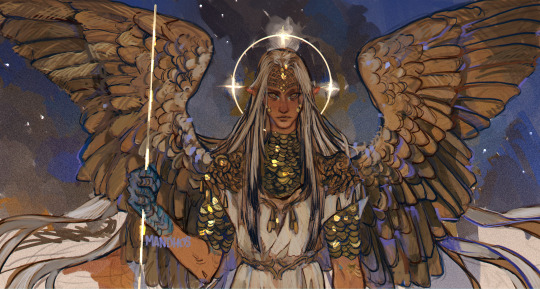#tolkien maia
Explore tagged Tumblr posts
Text
Lúthriel – @luthriel-tinuviel
Quildalótien – @quiet-flower-wonderlings
Cala – @son-of-the-moon-and-sun
Ixalië – @illicit-unknown-shadows
Cóloniélë – @tears-of-burden
#the silmarillion#silmarillion#eunoiawrites#the silm#silmarillion oc#tolkien#tolkien oc#maia#maia oc#valar oc#valar#tolkien elves#tolkien maia#tolkien valar#tolkien maiar
66 notes
·
View notes
Text
Eönwë, Herald of Manwë & Ilmarë, handmaiden of Varda


Eönwë likes shiny stuff, I don´t make the rules
#it is late wow#just a lil something#i wanted to draw some jewlery....#tolkien#jrr tolkien#silmarillion#eonwe#eönwë#ilmare#ilmarë#tolkien art#silm art#digital art#my art#maia#maiar
572 notes
·
View notes
Text

The family tree of Eldarion, son of Elessar/Aragorn and Arwen, Heir of all the Houses of Edain and Eldars, with Maia's Blood too!
#house of edain#edain#gondor#numenor#rivendell#silmarillion#lord of the rings books#lord of the rings legendarium#the silmarillion#the quenta silmarillion#tolkien elves#tolkien edain#tolkien legendarium#tolkien#lotr books#lotr#lotr aragorn#aragorn x arwen#beren and luthien#elu thingol#melian#half elves#maia tolkien#family tree
478 notes
·
View notes
Text
Celegorm but everything about him is 10x funnier because he's a chronic ainur fucker and just doesn't tell anyone about it. He looks inwards and decides marriage is between elves so deciding to roll around with maiar of the hunt is absolutely valid and not marriage. Who's ever heard of an elf marrying a Maia?
Elven polyamory may be illegal but it doesn't count if he's just ferrying kisses between Oromë and Vána- they're not elves. No, it's not hypocritical, what are you talking about. Just don't tell his father. What? No, not because of the whole polyamory thing, Feanor's just got a thing about Valar. Yes Celegorm is sure that's the only reason he doesn't want to tell his dad.
#tolkien#silmarillion#silm#celegorm#tyelkormo#orome#vana#yes this means tyelko is taking the dog in the divorce#the moon appears and he's like immediately “ayo that's Tilion”#curufin voice: how are you recognising a maiar who is currently the fucking moon#tyelko voice: funny that you'd mention fucking the moon#do you see my vision#no one makes him weird enough. this man speaks dog and bird and fistfights people over dragonfly linguistics#of course he's mental gymnasticing his way to convincing himself that he's definitely not disappointing his father#(a common feanorian pastime)#just imagining the Doriath beef here btw#“why's thingol so special huh” “I mean he did marry a Maia” “he's not special do you know how many times I had to get an impromptu divorce”#“what” “yeah cause I'd accidentally marry a Maia. or like Oromë once or twice”#“OROME??” “ok maybe three times”
489 notes
·
View notes
Text
Me, while reading The Lord of the Rings: So, are we ever going to learn what the deal is with Gandalf and the other wizards? Tolkien: How do you mean? Me: Well, they're clearly very long lived, they came from over the sea many ages ago, Gandalf at least can do magic; so what exactly are they? Are they Elves, are they Men, are they something else? Tolkien: Angels. Me: Ah, okay. Me: ... Me: ......what. Tolkien: They're angels in human form. Me: What? Tolkien: And Sauron is also an angel. Me: What??? Tolkien: Maybe I should have expanded upon that in the main trilogy? Me: You could have stood to mention it a little more, yes.
#gandalf#saruman#istari#lord of the rings#the lord of the rings#lotr#silmarillion#maia#tolkien#jrr tolkien
1K notes
·
View notes
Text
It's a lovely day in Beleriand, and you are a horrible goose
AU where Elwing, after being told that Elves can’t go back to Middle Earth, argues successfully to Manwe that clearly this rule doesn’t apply to migratory birds. Since Manwe 1) feels bad for her and 2) loves birds, he rolls with this, though he does point out that she won’t be able to turn back until she returns to Valinor.
Feat. Bird-Elwing being violently protective of her sons and tormenting the Feanorians. She eventually figures out that they mean well, which does not actually stop her from stealing Maglor’s harp and throwing it in the pond, or pecking him when he’s not paying attention, or sneaking up and honking as loudly as possible.
(Maedhros gets less of this, because he is 1) scary and 2) completely unimpressed. Maglor yells, which is more entertaining)
Elwing still can’t talk to her sons, but she can gather them under her wings to sleep and preen their hair and hope they know, somehow, how much she loves them.
#silmarillion#jrr tolkien#elwing#elrond#untitled goose game#maglor#maedhros#horrible goose elwing#technically she's a seabird#crack fic#Maedhros thinks that the Horrible Bird is a Maia#Maglor thinks it's a punishment of the Valar for him specifically#Elrond and Elros are pretty sure it was sent by their mom
238 notes
·
View notes
Text
Do you think elves felt when Númenor sank. When the world turned round. Do you think Elrond felt the moment when his brother's legacy was swept by the waves, and his blood punished for their craving to have more? Thousands years old heritage lost forever? Do you think
#elendil and the faithful surviving and getting to eriador had to be like therapy for him#more so when they got news from isildur and anárion in the south#just saying#if elves didn't feel it happening#elrond part-maia peredhel SHOULD have#rotating my blorbo in my head and making his life worse#tolkien#elrond#lord of the rings#lotr#silmarillion
335 notes
·
View notes
Text
thingol as melian's own one ring, into whom she poured her spirit and power and divinity, is such a heartrendingly romantic concept
#what do y'all know about REAL love#thingol x melian#thelian#elu thingol#elwe singollo#thingol#melian#melian the maia#tolkien tag#tolkien#the silmarillion#the silm#silm#silmarillion#jrr tolkien
191 notes
·
View notes
Text
Sauron, Galadriel, & Tolkien's Theology of Repentance - Part One

Summary: Character meta analysis on Sauron (and Galadriel, through the lens of Sauron). Based on both Silmarillion & RoP canon. 3.5k words. Discussion of Catholic theology involved. Blanket TW for discussion of violence, manipulation, etc., because Sauron. Spoilers for S1 & S2 and the Silmarillion, of course. The tragedy of Sauron is that he gets offered so many legitimate chances at redemption and forgiveness, and he denies them every single time. But we know he wants absolution, because that’s what he sees Galadriel as: his chance to bind himself back to the light, to be Mairon again, to heal the pain that he caused and that was caused to him under Morgoth. But because he has such a warped view of himself and his actions, he dismisses genuine extensions of compassion, forgiveness, and care as simultaneously beneath him and too good for him. And yet, he still pursues redemption, but through none of the channels offered to him.

In The Rings of Power, he’s given the explicit instruction to change for the good in the village after he’s reborn. He’s given the chance leave his past behind and work meaningfully in Númenor. He’s given the chance to redeem himself by Galadriel's offer of friendship (or love, depending on your interpretation). In the Silmarillion, he's even given the chance by Eönwë himself, and comes close to leaving Morgoth behind completely!
Let's look at this passage from Of the Rings of Power and the Third Age (emphasis mine):
When Thangorodrim was broken and Morgoth overthrown, Sauron put on his fair hue again and did obeisance to Eönwë the herald of Manwë, and abjured all his evil deeds. And some hold that this was not at first falsely done, but that Sauron in truth repented, if only out of fear, being dismayed by the fall of Morgoth and the great wrath of the Lords of the West. But it was not in the power of Eönwë to pardon those of his own order, and he commanded Sauron to return to Aman and there receive the judgement of Manwë. Then Sauron was ashamed, and he was unwilling to return in humiliation to receive from the Valar a sentence, it might be, of long servitude in proof of his good faith; for under Morgoth his power had been great. Therefore when Eönwë departed he hid himself in Middle-earth; and he fell back into evil, for the bonds that Morgoth had laid upon him were very strong.
This passage is clear that Eönwë is willing to pardon Sauron--he simply did not posses the power to do so. But when Sauron was told he must appeal directly Manwë, he gave up entirely and skulked back to Middle-earth. There are a few ways to read this:
1. He was not wholly repentant
Sauron simply wanted the protection of a new master in the absence of Melkor. i.e., he was rather fickle and simply wanted to be on whatever the "winning" side was. This is supported by the text literally saying that at least some of his obeisance was completely false, and that he only made a point of feeling bad about anything once his master had been chucked into the Void and his armies and strongholds were being destroyed (Thangorodrim). In this reading, perhaps Eönwë saw Sauron's treachery and referred him to Manwë knowing that it would be a test of his true intent. However, while a valid interpretation, I believe this to be the less holistic of the two.
2. He was truly repentant
Sauron did truly feel badly and "abjured all his evil deeds," but he was unwilling/unable to humble himself after being so fundamentally broken by Melkor and developing an insatiable power lust (hey, he isn't defined in the narrative by lust and pride for nothing).
Earlier in this same chapter, Tolkien wrote that Sauron could "...deceive all but the most wary." This is in the specific context of his physical shapeshifting. But, I would argue that this can also be tied to his lies. Tolkien has a specific ethic of beauty, where physical perfection is equated with moral goodness. Sauron completely inverts what is otherwise a hard and fast rule within Tolkien's writings by being the character most frequently described as "fair"--seven times to Lúthien's six, and she was the most beautiful woman to have ever lived!
(Side note: I have another post on Tolkien & beauty in the works where I'll get more into this idea)
Why does this matter? Even though this interaction with Eönwë takes place in the First Age, Sauron could at this point be in the demonic form Mirdania describes in the forge. And, I am inclined to believe that Eönwë, as the head Maiar and herald of Manwë, would be a pretty wary guy, and thus able to sense any of Sauron's trickery. I read this to mean that Eönwë looked at Sauron and saw his potential to be Mairon again, either in absence of his evil form or in spite of it.

Because Sauron is incredibly beautiful. And even if it is a disguise of the true, depreciated form of his spiritual essence, he presented himself to Eönwë at his most beautiful. He wanted, even in his act of repentance, to make himself more favorable in Eönwë's eyes. To show up as Mairon (who was likely close friends with Eönwë before everything went down, since they are considered to be two of the most powerful Maia and would have worked closely together).
But I don't think this was all manipulation on Sauron's end. I agree with the scholars mentioned in the text who believed that Sauron was truly repentant--which is why Eönwë even bothered referring him to Manwë instead of kicking him into the Void with Melkor.
And this is the tragedy: Sauron is told exactly how to repent, and believes fundamentally that it is an impossible path for him. And yet, he still longs so intrinsically for it! He was, under Aulë, a Maia of precision, perfection, and order. Under Morgoth, he feels disordered, dis-regulated. He needs to correct the fundamental imbalance within him, so why does he flee Eönwë?
It comes back to Sauron's pride.

If he follows through with this path of reconciliation, there is no way he can hide or pretend his actions away. If he cannot trick his fellow Maiar, he certainly cannot trick the Valar. And he cannot stand the idea of submitting himself back under their rule, especially now that he has tasted power. This is a pride wound; it is why the idea of confessing to Manwë would be humiliating to him as opposed to just upsetting/uncomfortable.
Again, the pivotal moment: he is told how to make amends for crimes and determines that he cannot do it. So he returns to Middle-earth and stews in his own self-hated and self-pity for a few years. In that time, he consciously or subconsciously latches onto Eönwë's offer--forgiveness from penance. It is the way forward. And if he cannot earn penance at Manwë's hand, he will do it on his own.
The Prodigal Son
This is where we have to talk about the Catholic roots of Tolkien's work for a moment. The scene where Sauron approaches Eönwë mirrors the biblical parable of the prodigal son. In this story, a man abandons his family, spends all his money, and falls into ruin. But when he recognizes his failings and returns to his father to get help, he is welcomed back into the family without question--in other words, he is forgiven and restored to his former position.
17 But when he [the prodigal son] came to himself he said, “How many of my father’s hired hands have bread enough and to spare, but here I am dying of hunger! 18 I will get up and go to my father, and I will say to him, ‘Father, I have sinned against heaven and before you; 19 I am no longer worthy to be called your son; treat me like one of your hired hands.’” 20 So he set off and went to his father. But while he was still far off, his father saw him and was filled with compassion; he ran and put his arms around him and kissed him. - Luke 15:11-32, NRSV CE (emphasis mine)
The parallel is clear; Mairon, the repentant Maia, returns home with hopes of reconciliation. He is prescribed the same task that the prodigal son offered to his father: he must be bound in servitude to his father/creator in order to pay off his debts. This is a deliberate allusion from Tolkien. The story of the prodigal son models the path of reconciliation that Eönwë describes. Tolkien seems to be drawing a line in the sand with this: Sauron is unwilling to do the work required by the Valar for repentance, so he is unable to receive the grace of a warm welcome back into the fold of the Ainur. Since he did not humble himself, he has to be told to do it. And he does not want to! He wants to be loved, but he also wants his power--evidence, in a way, of how his character was fundamentally altered in his time with Morgoth.

His pride--and his fear--cut him off from the potential of grace. He does not know for certain that Manwë would subject him to servitude (though I would argue that it's textually evident that it is a custom), but this assumption leads him to flee, which allows him to slip back into his old ways.
He wants to be Mairon (admirable) again, not Sauron (abhorrent). He wants to be accepted and loved, but not punished. He wants the benefits of reconciliation without the work he would have to do to earn it or the shame he would feel as he did. It's pride, but it's also deep shame--the flip side of his extreme ego is an implicit self-hatred, one that we can see in the subtext of how he speaks about himself and about his time with Morgoth.
Even the language Tolkien uses is heavily shame-coded, especially in a Catholic context; Mairon did not go willingly, he was "seduced." He admits to Celebrimbor that he was "tortured by a god". It becomes exceedingly clear through both text and on-screen canon that Sauron was routinely broken and abused for centuries. This has fundamentally damaged his self-perception, which is ultimately what leads him to "[fall] back into evil"--whether due to pride or shame, he hides, perhaps because he consciously or subconsciously does not believe that he deserves forgiveness, no matter how much he craves it.

Naked in the Garden
His flight back to Middle-earth after meeting Eönwë is reminiscent of another biblical scene, where Adam and Eve, after committing the first sin, hide from God in shame and fear (emphasis mine):
7 Then the eyes of both were opened, and they knew that they were naked...9 But the Lord God called to the man, and said to him, “Where are you?” 10 He said, “I heard the sound of you in the garden, and I was afraid, because I was naked; and I hid myself.” -Genesis 7-10, NRSV CE
The image of nakedness is, here, one of vulnerability, and Tolkien establishes that Sauron fears that which he cannot control. He needs the Rings under his power. He needs his armies and his enemies under his watchful eye. He is petrified of letting his power slip away (possibly due to never wanting to feel powerless in the hands of a Vala, fallen or not, again).
The biblical allusion here hearkens back to the fear Tolkien describes Sauron as feeling regarding his return to the Ainur. In the religious system Tolkien has established, which is likely inspired by his own religious beliefs, Sauron has sinned, and must make penance. But he is afraid of God/Manwë, and does not want to "let go" of his sin. In other words, he is not truly repentant. This reflects the Catholic sacrament of confession, which requires self-reflection and resolve to never commit the sin again.
Instead of shame driving him to contrition, it drives him to isolation.
But he still wants forgiveness. So, in his years of hiding in Middle-earth, he decides to earn it himself. His own way.

Enter the Rings.
Sauron wants to perfect the wrong he wreaked so that he can both earn his way back into the Ainur and keep his power. But what he does not realize is that this does not work. Eönwë is clear that he must forsake his true temptation--absolute power--through penance by submission. Yet Sauron in his pride thinks he can have it all. Sauron is a very carefully controlled villain, and the only times he snaps or makes significant mistakes are when his inflated self-perception is challenged, revealing the self-loathing and/or self-pity underneath. The best example of this is when he kills Celebrimbor prematurely, and cries afterwards. Why? Because Celebrimbor was right about him, and he hates it. He hates knowing that he is nothing more than the Morgoth's shadow, because Morgoth was his master as much as he was his tormentor. As Sauron puts it, his relationship with Morgoth was often defined by pain as a test to see "whose will was the mightier":
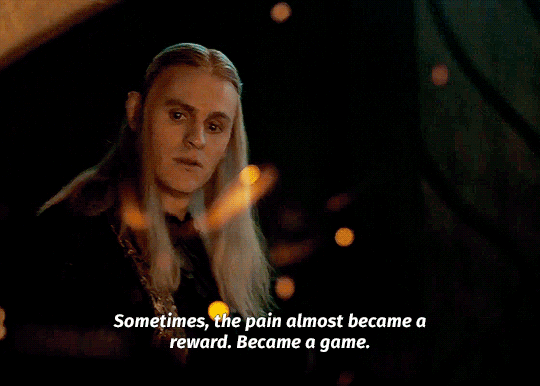
This image carries more shame, both in its implicit sexual connotations and in the simple power dynamic of it. Sauron, even though misguided, is rallying against Morgoth. He wants to break what Morgoth has created and build something new, something better, something apart from his old master entirely. But Celebrimbor confronts him with reality: he has not created something new, and perfect, and special, as he so wanted to--he can only act in imitation, not in generation. And when he got close with the Rings, it cost him everything. It's almost like he wants the power of a Vala, and loathes that he cannot attain it.
And this is why he becomes so singularly obsessed with Galadriel.

She’s his foil. They both crave power and adoration, but in the end of things, she does not fold under his temptation. She turns down everything she has ever wanted for the greater good and for the sake of her own soul. Sauron looks at Galadriel and perceives that she would have succeeded at Eönwë's test because she is willing and able to humble herself. This maddens him to the point of both desiring her and desiring to break her.
She learns that she is easily tempted and becomes strong enough to handle it (through a lot of tough love from Elrond & co.). She has to learn how to do it, but she is able to.
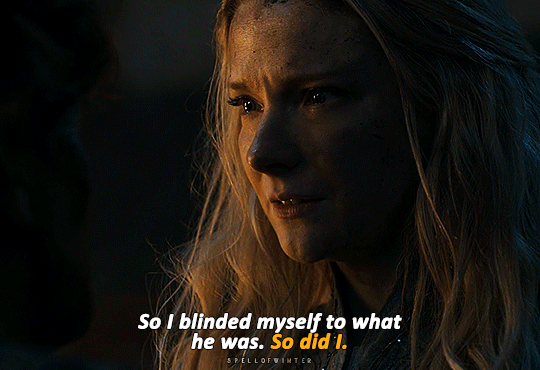

She grows from someone who resisted and rejected authority to someone who is trusted as an authority because of her ability to wield it wisely (see: Gil-galad allowing her to answer for him in 2x08).
In other words, she earns the trust, love, and support of her community. Sauron has to force his to comply—it is an illusion of love.
His possessive obsession with her also stems from her fairness. She was the object of her uncle Fëanor's obsessive desire for creation as well. Her hair was the inspiration of the Silmarils (see: The History of Galadriel and Celeborn; The Shibboleth of Fëanor - source with page #s here), which Morgoth desired more than anything to possess.
Sauron, wanting to spite his master, wants one better--to own that which inspired the Silmarils, to own the image of fairness (and thus of moral good) completely. This is why he wants to bind himself to her. This is why he needs her. He sees Galadriel as his mechanism of repentance, and his last triumph over Morgoth. Winning her is his salvation as much as it is proving that his will is the mightier. It is his way of dominating Morgoth. This starts, I think, as a genuine effort at proving himself to the Valar, but quickly consumes him entirely. He is overcome with the desire for revenge, just as Galadriel was at the beginning of the First Age.
And he sees this in her. Sees their similarities. Sees that she, too, is angry and lonely and so afraid of losing her power. And he leverages that to befriend her. This is where it gets ambiguous and you can read RoP as either painting the image of Sauron being earnest but completely misguided in his proposal, or you can see it as him being entirely manipulative.
I think the truth of that scene probably falls somewhere in the middle; just like when he presents himself to Eönwë, he is sincere in his desire, but only knows how to present it in an inherently contriving way. He does want to bind her to him, so he tries to only reveal to her the good aspect of that desire (and also of his desire for power, which he allows her to see because he believes that it is good and also because she understands it), and not the ugly underside of his internal struggle against Morgoth, the Valar, and himself.
And I do think, in his own way, he cared about her. Galadriel consistently shows kindness and compassion to him. In S1, they grow to know each other's minds and souls, and she considers him a close friend. He finds comfort in this, that someone could see the blackness of his heart and care for him anyway. He thought, in his isolation, that he lost that chance when he fled back to Middle-earth. And here is the very picture of the light itself telling him that she supports him, that she sees the good in him, that she wants to help him set the world to rights! Of course he is infatuated by this. Of course he also wants to use it. He is Sauron.
But Galadriel succeeds where he fails, so he stops playing nice and tries to forcibly drag her down with him. First, by baiting her with the image of the man she cared deeply for:
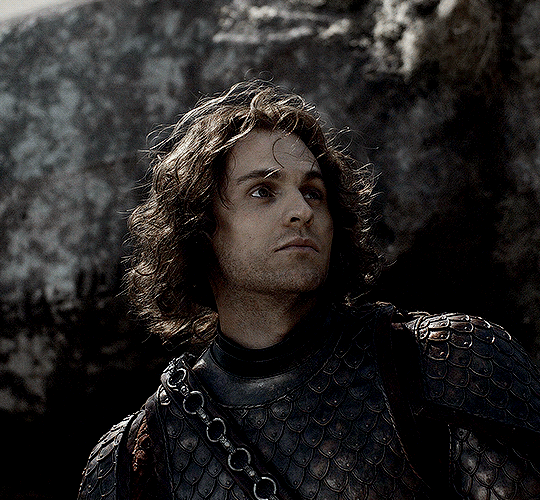
Then, by reminding her of all she is losing by rejecting him:

And she is still strong enough to say no. And not just to say no, but to shut the door completely. To look in the face of everything she has desired for centuries and turn it down, understanding that it will ruin her. Yes, she hesitates. Yes, she still wants it (wants him). But she wins the day by holding fast to the light that Sauron wishes so badly to bind himself to.
Because she has lost everything--her brother, her husband, the station as commander, the trust of her high king and best friend--and earns it back only through her resistance of her greatest temptation. It is a struggle, it is painful, it nearly kills her--but she does it. She wins the test that Sauron could not even bear to face.
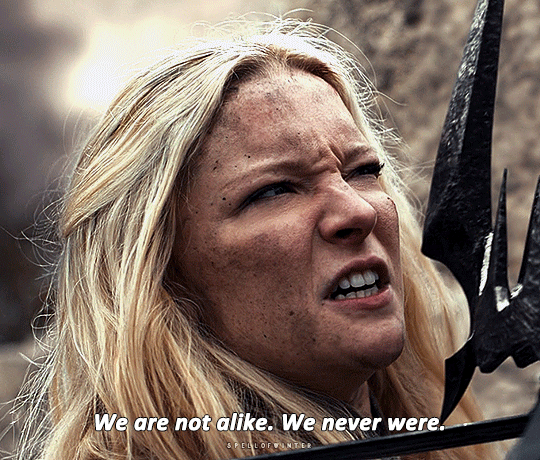
In their headlong, self-sacrificial tendencies, they are the same. Both view themselves as fundamentally stronger/better than their peers while also being deeply lonely due to their self-imposed isolation (Galadriel's laser-focused hunt for revenge, Sauron's exile in Middle-earth). But to Galadriel, the light is more important than her pride.
For Sauron, the light is his source of pride. He desires it more than anything, but condemns himself to never being able to touch it due to his rejection of Eönwë's offer. Paradoxically, he tries to grasp at it through Galadriel, the living silmaril, and succeeds only in darkening her. We learn from Gil-galad in 2x08 that his crown piercing her flesh in an act of brutal domination nearly strips her soul from her and pitches it into the unseen world. In this, Sauron is saying: If I cannot have you, I will force you to need me. I will break you into loving me.

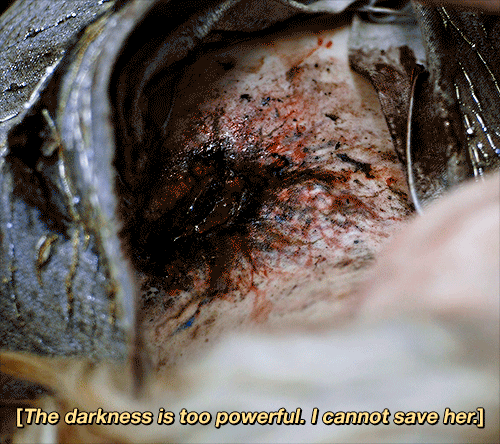
He says this to Celebrimbor as well. He no longer knows how to love properly. He only knows how to inflict pain until this object of his obessive desire needs him--just like how his immortal spirit was broken into submission by Morgoth. And isn't this revealing of his own sense of self? He refuses to suffer the path of light, but willingly suffers the maddening path of darkness because it is a comfortable, familiar suffering. One, he tells Celebrimbor, he even grew to enjoy (2x08). As the path of the Rings drive him madder and madder, his desire for the light (Galadriel) and the return of his power (Celebrimbor) become further disordered and corrupted until they culminate in him destroying them--and his chance at earning/owning them--entirely.

And this is Sauron's ultimate point of no return (which we will hopefully see in S3 🤞). The razing of Eregion and slaying of Celebrimbor were acts of petty rage he committed when his pride was injured. This was the final nail in the coffin. Galadriel, in her rejection of him, ruins what he sees as his true chance for redemption.
Galadriel, now stepping into the role of Eönwë, re-opens the invitation: "Heal yourself!" (2x08). But in rage and shame and stubborn pride, he turns it down again. I believe this is where his desire to heal Middle-earth shifts fundamentally into desire to dominate Middle-earth. He always wanted to rule, but now he wants to own.

#fae speaks#I spent hours pouring thru the Silm and RoP for this so if you enjoyed please let me know I'd love love love to talk about it more <33#sauron is my favorite freak in all of tolkien's lore rn I want to study him like a bug#btw this is saurondriel (and even silvergifting? if u squint) positive but with loads of nuance. i see haladriel as love and saurondriel as#possession. both are fun in fiction of course but I want to acknowledge how deeply messed up the dynamic is#but also! it's fiction! do whatever you want with it! if you want saurondriel to get a happy ending then do it <3#and send me the fic so i can read it because i'm team half-maia celebrian hehe#also if there are any glaring gaps in my knowledge of the silm pls lemme know it's been a minute since i've read it all the way through#part two will be on beauty and evil in tolkien's cosmology :)#tolkien#the silmarillion#the rings of power#rings of power#trop#rop#sauron#halbrand#annatar#galadriel#sauron x galadriel#saurondriel#haladriel#trop spoilers#trop season 2#trop meta#rop meta#rop theory#trop theory#celebrimbor#my metas
165 notes
·
View notes
Text
Part Two
“for a moment, you seemed her perfect likeness…”

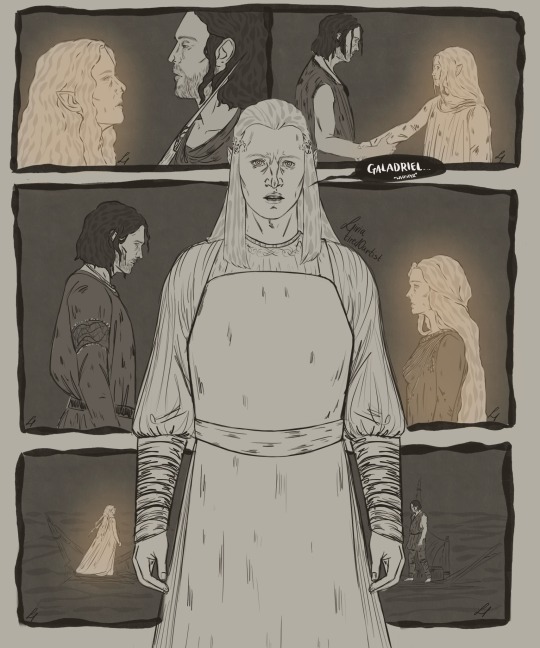

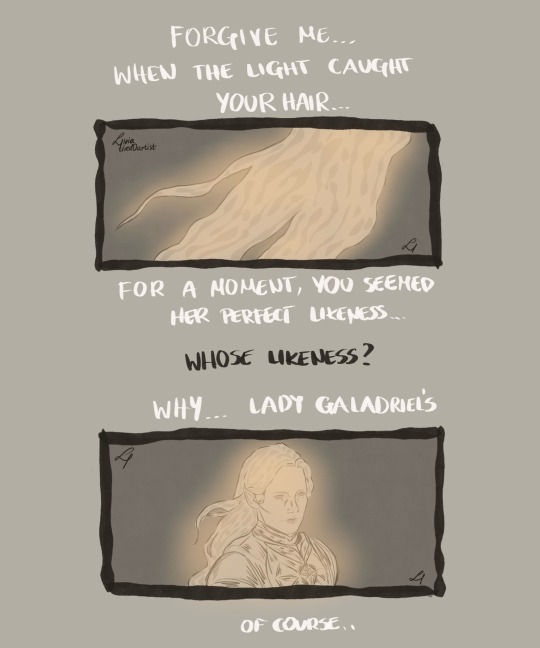
#digital art#fanart#haladriel#galadriel x halbrand#halbrand x galadriel#halbrand#galadriel x sauron#galadriel#sauron#annatar#the rings of power season 2#the rings of power#trop#trop season 2#annatar x Galadriel#middle earth#tolkien#fanfiction#the dark lord#romance#enemies to lovers#sauron the deceiver#sauron the delusional#delulu#mairon#maia#lotr
173 notes
·
View notes
Text
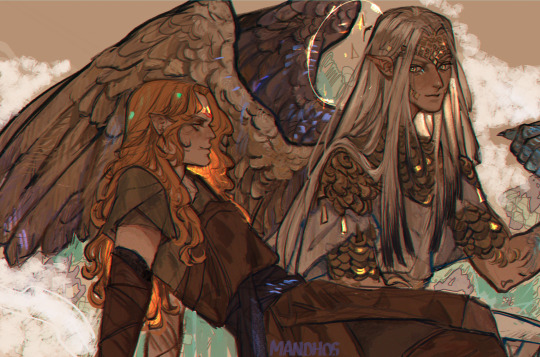
2K notes
·
View notes
Text

The Lord of Gifts.
Companion painting of the "Silver-fist".
#oh i really needed to draw my emotional support evil maia after this week#silmarillion#silm#silm art#the silmarillion#tolkien#mairon#sauron#annatar#lotr#lord of the rings#art#illustration
1K notes
·
View notes
Text
I wasn’t going to say anything originally, but I’m still really annoyed with that one reblog on my bingo card post.
So let me make this very clear:
MELIAN IS NOT A SELFISH NARCISSIST FOR ABANDONING DORIATH
I can’t believe this needs to be said, but apparently it must. Not only is it such a bad faith argument, but it’s completely wrong.
Melian was going through a tremendous amount of grief that was completely alien to her as a Maia. First, Lúthien became mortal and left Doriath to live a mortal life, and Melian has to deal with the fact that one day, she’s going to outlive her own daughter. Then she gets a chance to be a mother again when she and Thingol adopt Túrin, but despite her best attempt to raise him well, he runs away and ends up dying by his own sword. Which means she’s lost another child of her own.
She’s going through the kind of grief that no parent deserves to endure. Túrin may not be her biological son, but his death would’ve really hurt her, without a doubt.
Then, Thingol is suddenly murdered by the dwarves after a fight over the Nauglamir. Her beloved husband, the one she gave up Aman for, is dead, and by this point, Lúthien and Beren are both getting old and they’re also going to die in a couple of years. Melian is realizing that she’s going to basically outlive her entire family.
Can you imagine how that must feel for a Maia like Melian? She must’ve been going through so much pain and grief and heartache. I bet that this is when her Girdle around Doriath begins to fail— the Girdle doesn’t fall yet, but the sheer depth of Melian’s grief is enough to start weakening it.
Being in Beleriand would’ve been completely unbearable for her now. It actively starts to hurt her very spirit, and her powers weaken. I think she realized that if she stayed any longer, her powers would fail her, and she would probably fade away.
Melian didn’t abandon Beleriand because she was selfish. She left Beleriand because she realized that she could no longer live there without the one thing that made her powers flourish— her family.
I’m begging you, have some compassion for female characters and read through the book again PLEASE!
#the silmarillion#silmarillion#the silm fandom#melian#melian the maia#thingol#elu thingol#elwe singollo#doriath#sindar#jrr tolkien#tolkien#tolkien tag#silm meta#tolkien meta
141 notes
·
View notes
Text
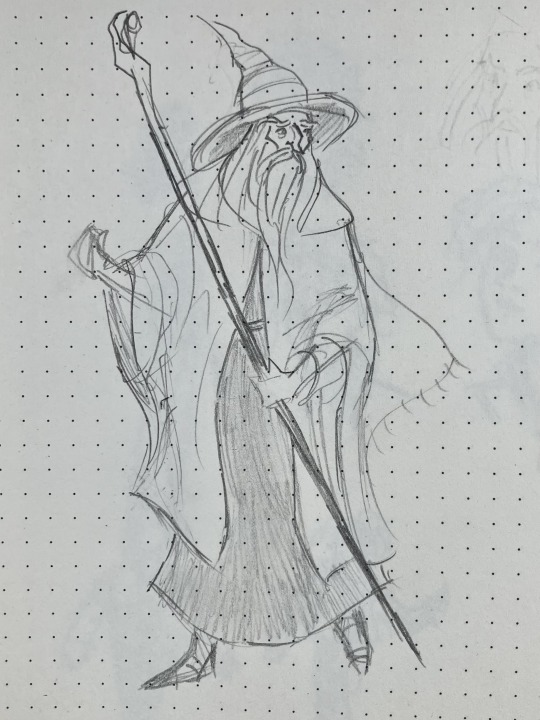
the grey pilgrim!!
#my art#Sketch#GANDALF#THE MAIA THE MYTH THE LEGEND#drew this in the car while listening to the hobbit audiobook#An audiobook which never gets old lol#Lotr#the lord of the rings#gandalf the grey#lord of the rings#the hobbit#tolkien#tolkien describes him in the hobbit as having a blue hat and a silver scarf so anyways that is what he is meant to have here#Also the magnificent eyebrows ofc
153 notes
·
View notes
Text
the thing about Half Maia Celebrían that the haters don’t get, is that it allows for some very sad things to be slightly less sad.
Celebrían didn’t have to go west because she suffered something so terrible she could never be healed in Middle Earth. Instead she realises that her presence could be a powerful advantage for the enemy. She leaves instead to protect Middle Earth and everyone she loves.
Arwen doesn’t rest alone amongst the graves until the world has changed, the disembodied spirit of her grandpa can hang out with her, talking about how it is worth it to fall in love with someone you shouldn’t.
Like, idk, people keep thinking it’s a horrible story, but I think it’s actually a very beautiful one.
144 notes
·
View notes
